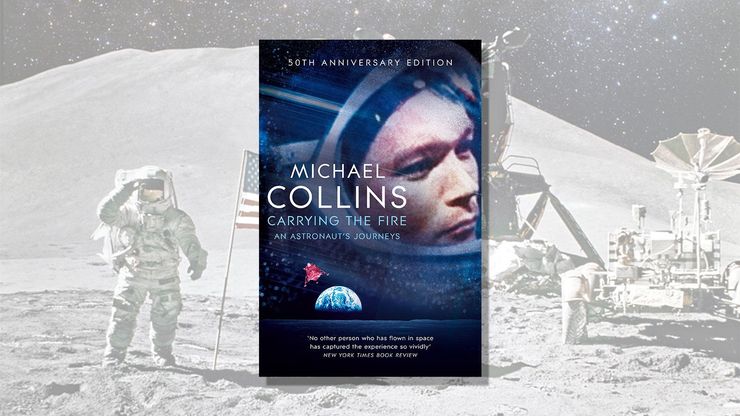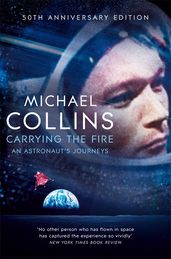Astronaut Michael Collins reflects on the Apollo 11 mission
Michael Collins reflects on his career as an astronaut and what the future of space exploration might hold for humanity.

Michael Collins was the Command Module Pilot of Apollo 11, famously orbiting the moon alone while Neil Armstrong and Buzz Aldrin became the first men to set foot on its rocky surface. While he was often called 'the loneliest man' due to his crucial role in the mission, during which he would even lose contact with Mission Control for fort-eight minutes of each orbit, Michael famously shared that in fact, he never felt lonely at all.
On 28 April 2021, Michael sadly passed away at the age of ninety.
In his astounding memoir, Carrying the Fire, he shares his memories of the historic moon landing that took place over fifty years ago, on 20 July 1969. Here, Michael reflects on his incredible career as an astronaut and what he thinks our next great steps into space will be.
I guess another decade must find me ten years older but I don't feel that way, although some sad things have happened. Old friends, John Young and Neil Armstrong, have died, and my life has changed with the death of my wife, Patricia Mary Finnegan Collins, after fifty-seven years of marriage. I miss her dearly and daily. My beautiful and competent daughters, Kate and Ann, help me fill the void. I still live and fish near Florida's Everglades. I have hated the word octogenarian, but as I look at age ninety in 2020, it doesn't sound too bad.
In the world of spaceflight, nothing spectacular is being done. The shuttle era has ended, and the International Space Station so far has produced little news except for Scott Kelly's nearly yearlong stay while his astronaut twin brother Mark served as a control on the ground. However, there seems to be a new optimistic spirit in the air, and plans are burgeoning, centered on building a lunar base preparatory to a Mars landing. As I have written in Mission to Mars and elsewhere, that planet, not the moon, has always been my favorite. I used to joke that I flew to the wrong place, and that NASA should be renamed NAMA, the National Aeronautics and Mars Administration.
But NASA it is, and today, for the first time since the days of Wernher von Braun, two names are recognizable in the world of spaceflight: Elon Musk and Jeff Bezos. They seem to be able to do things faster and cheaper than the government, and a generation that never knew Apollo is awakening to the prospect of further space exploration. Musk is a billionaire, and Bezos is the richest person on the planet. Musk is specializing in reusable rockets, but ultimately wants to colonize Mars, starting as early as 2020 with the unmanned Blue Dragon, and then with an expedition crew of one hundred. (In my Mars book, I thought a crew of six might be more practical.) At any rate, it's nice to know that exploration has some solid backing, and that private funds are now in the game alongside NASA's annual $20 billion or so in taxpayers' money. NASA says people on Mars is a possibility in the 2030s.
Mars. Why so long to get there? Although it's the next logical destination, it is very complicated. Different in almost all respects from Earth, Mars is nonetheless the closest thing to a sister planet, at least one close-by. But in this case, close is a relative term, as Mars takes a gigantic loop around the sun, as do we. Our elliptical orbits are such that we come as close as 35 million miles to each other and as far as 220 million. A rocket leaving Earth for Mars has a choice of many possible paths, but the most economical in terms of fuel is called a Hohmann transfer, and takes between six and nine months one way. Our two orbits are such, however, that a crew arriving at Mars from a Hohmann would have to wait a year or more for a favorable return alignment. Therefore, a round trip would take more than two years. Compared with Apollo's eight days, that is huge, and creates a host of new issues. Mission duration can turn minor annoyances into big problems. The first thing an astronaut thinks about is, 'What if something goes wrong?' Well, tough – you might be a year away from the safety of Earth, so your equipment and your body better be able to handle it.
‘The first thing an astronaut thinks about is, 'What if something goes wrong?' Well, tough – you might be a year away from the safety of Earth, so your equipment and your body better be able to handle it.’
As for the environment, probably the worst problem is radiation, both solar and cosmic – high-speed particles from the far corners of the universe. As survivors of Hiroshima can attest, radiation can cause terrible damage to the human body. Even shielded from it, the crew would have to adjust to weightlessness if their craft was not producing its own gravity, probably a lot less than one G if it is rotating. Our experience with the space station shows that cardiovascular problems can ensue, and that reduced G can cause increased pressure on the eyes, from within, that can damage vision. Once on Mars, with about a third of one Earth G, the crew should be quite comfortable (perhaps even exuberant), but must still be provided with sufficient oxygen and protected from radiation. The atmosphere is too thin to be of much help, and is quite toxic as well.
All in all, Apollo was child's play compared to a Mars landing.
One could fly directly to Mars, as outlined, or use a lunar base as a fuel-and-water depot. President Trump has opted for the latter, and so directed NASA. I have always favored a direct flight, my reasons having less to do with technical factors and more with politics and finances. Thanks to President John F. Kennedy, Apollo was a masterpiece of simplicity: 'I believe this nation should commit itself to achieving the goal, before this decade is out, of landing a man on the moon and returning him safely to the earth.' The What and When decided, with NASA to fill in the How. We had our clear marching orders, and they were very helpful in getting things done. For Mars, a prior stopover on the moon? I fear this complication would run into its own snags and delays, costs would escalate, and the schedule would dissolve into 'Yes, of course we are going to Mars, but first we have to fix the lunar –.' Not direct, not simple. Sometimes, in space planning, it costs less in the long run to go all-out in the first place. On the other hand, Neil Armstrong thought it was wiser to first fill in some of the gaps in our knowledge, and a lunar base could do that. Neil was a much better engineer than I, and I concede he was probably right in this case.
Perhaps the fact that I would gladly bypass the moon makes me confess that I don't think it too homey a place. The moon's jagged contours certainly stick in my memory but just barely, compared with the vision that I summon over and over again of the itsy-bitsy sphere just outside my window, motionless, cradled in black velvet. That sight – the Earth, tiny, shiny, blue of sky and water, white of clouds, with only a brown trace of land – haunts me. I can blot it out with my thumb, but back it comes, 200,000 miles away, quiet and peaceful-looking even though I know that it is neither. Surprise! If allowed only one word to describe Earth, I would say fragile. Give me a second choice and I'll pick inhabited. Now, that is a reach, because that is what I could not see. But it doesn't matter, because I did feel something – a presence – like tiny creatures crawling ant-like over Earth's surface. I couldn't help but ask, what are they? Why are they running around? How many? Where going? Is all OK with them?
‘That sight – the Earth, tiny, shiny, blue of sky and water, white of clouds, with only a brown trace of land – haunts me.’
. . . We lunar crews looked back at 3 billion earthlings. Almost fifty years later, the number is about 8 billion, ever increasing, with predictions of 10 billion or more by mid-century. This growth alarms some people, but not too many, I think; they have more pressing problems close to home. I tried to condense the situation in my concluding remarks in the Preface to this book's 2009 edition: 'We need a new economic paradigm to produce prosperity without growth.' I believe this even more firmly today. I believe Gaia is saying 'Ouch!' The increased burden on our resources is being absorbed, but at a price: more CO2 in the atmosphere, warmer temperatures, rising seas. The oceans are getting a double whammy, becoming warmer and more acidic. CO2 may be good for our forests, but my favorite waters, surrounding the Florida Keys, are experiencing widespread coral disease, whitening and dying due to these factors. Australia's Great Barrier Reef is similarly afflicted.
. . . Being an ex-astronaut is not as exciting as preparing for my next rocket ride, but after NASA, my working years were rewarding. My twenty-plus years in retirement have been fun and fulfilling in many ways. Watching my family grow, all doing well, has been paramount, but beyond that come fishing, reading, chasing the stock market, painting, and exercise, exercise, exercise. I'm not wealthy, but I have plenty to enjoy all these things in comfortable, or maybe even luxurious, surroundings . . . Lucky, lucky, lucky.
Michael Collins
August 2018
Fascinated by space exploration? Discover your next read with our list of the best sci-fi books.
Carrying the Fire
by Michael Collins
On July 20th 1969, three men – Neil Armstrong, Buzz Aldrin and Michael Collins – piloted the Apollo 11 aircraft to the moon. In his memoir, Carrying the Fire, Command Module Pilot Michael Collins shares his memories of the historic mission, his personal experience of space, and reflects on his truly incredible career as an astronaut.



